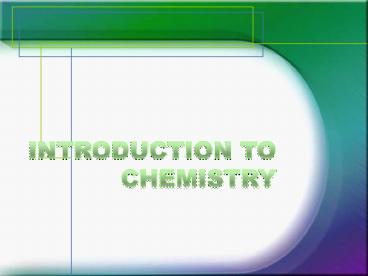Introduction to Chemistry - PowerPoint PPT Presentation
1 / 10
Title:
Introduction to Chemistry
Description:
What is Chemistry? 5 Major Areas of Chemistry Analytical Concerned with the composition of substances Inorganic Primarily deals with substances without carbon Organic ... – PowerPoint PPT presentation
Number of Views:377
Avg rating:3.0/5.0
Title: Introduction to Chemistry
1
Introduction to Chemistry
2
What is Chemistry?
- 5 Major Areas of Chemistry
- Analytical
- Concerned with the composition of substances
- Inorganic
- Primarily deals with substances without carbon
- Organic
- Primarily deals with substances containing carbon
- Biochemistry
- Chemistry of living things
- Physical
- Involves the behavior of chemicals
3
Scientific Method Define ?
- Steps to Scientific Method
- Making Observations
- Formulating hypotheses
- Performing experiments
4
Step 1
- Making an Observation
- State the Problem by looking at the world around
you to make an observation - Two types of observations
- Qualitative
- Quantitative
5
Step 2
- Formulating Hypotheses
- Research the problem
- What do I know, and need to know in order to
solve my problem? - Examine possibilities
- Eliminate poor choices
- Consider likely choices
- Determine a possible explanation
6
Step 3
- Performing Experiments
- Gather new information to determine if a
hypotheses is valid - Always produce new observations
7
Factors involved in the experiment
- Variable factor being tested in an experiment
- Independent (manipulated) adjusted by the
experimenter - Dependent (responding) value depends upon the
value of the independent factor
8
Controlled Experiments
- Control
- Part of the experiment without the variable, used
as a comparison - Data
- Information collected from the experiment
- Constant
- A factor that does not vary or change in an
experiment
9
Draw a Conclusion
- Was your hypothesis right or wrong?
- Problem solved proven
- If not solved retest
- What was wrong with the original experiment?
- Was there a poor selection?
- Was the experiment flawed?
10
Whats the Difference?
- Scientific Theory set of tested hypotheses that
gives an overall explanation of some natural
phenomenon - An interpretation possible explanation
- Natural Law when scientist see that the same
observation applies to many different systems - Summary of observed behaviors
- A law summarizes what happens a theory (model)
is an attempt to explain why it happens































